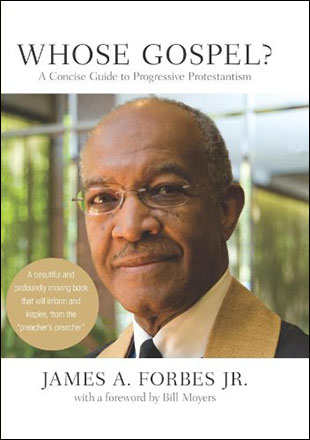James A Forbes is the founder and president of the Healing of Nations Foundation and Senior Minister Emeritus of The Riverside Church in New York City. Formerly a professor at Union Theological Seminary, he has also hosted The Time Is Now on Air America Radio. This book is part of The New Press's Whose Religion? series where leading thinkers representing major faith traditions speak out on the ways in which religious ideas and ideals can be applied to the contemporary scene. The books also chart new paths that can be taken by progressives in all religions.
In the foreword, Bill Moyers, who considers this African-American a friend and pastor for many years, praises the ethical clout of Forbes's thinking and preaching on racism; the realities of class, money and power; the broadness of God's heart and the smallness of our vision of the Holy One. Forbes offers his views of six crucial issues in our society: poverty, war, women's equality, racial justice, sexuality, and the environment. He sees the activity of the Spirit in these daunting issues along with the healing of the body politic's many infirmities and divisions.
Forbes supports the Statement of Openness, Inclusion, and Affirmation adopted by Riverside Church in regard to gay, lesbian, bi-sexual, and trans-gender (GLBT) people. He laments sexism and male domination over women; he supports the use of inclusive language in the church and elsewhere. The author was involved in the civil rights movement and has consistently believed in what he calls "the gospel of human race equality of being." Forbes maintains that the ethic of love and the spirit of generosity mean that we must look after the poor, feed the hungry, and heal the sick.
In the most poignant and illuminating chapter, the author presents a definitive outline of each of the Ten Commandments as offering a condemnation of war. (see the excerpt for more on this theme). And, of course, Forbes supports an end to our business-as-usual relationship with the environment where domination and exploitation still hold sway rather than loving and nurturing. The book ends with an affirmation of interfaith dialogue and partnerships.
